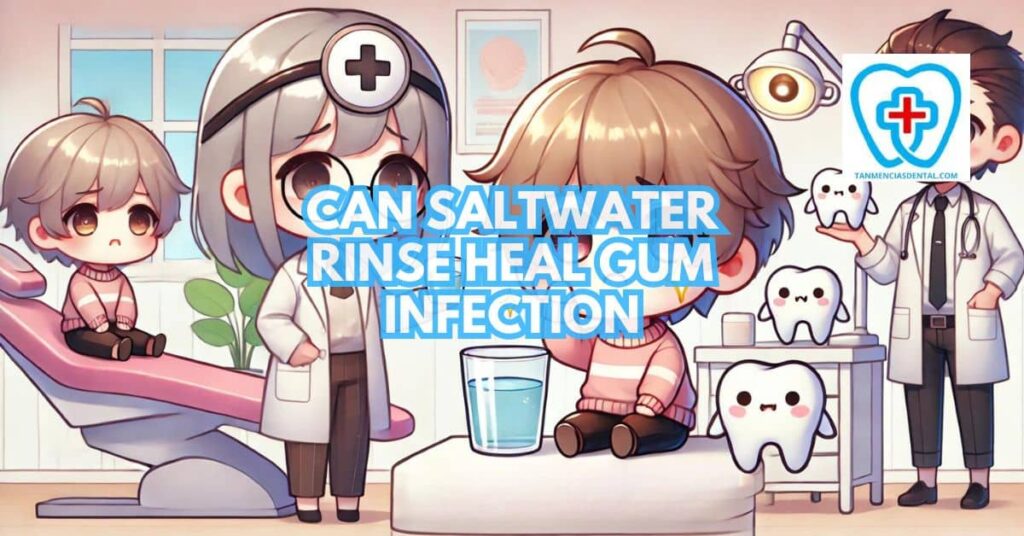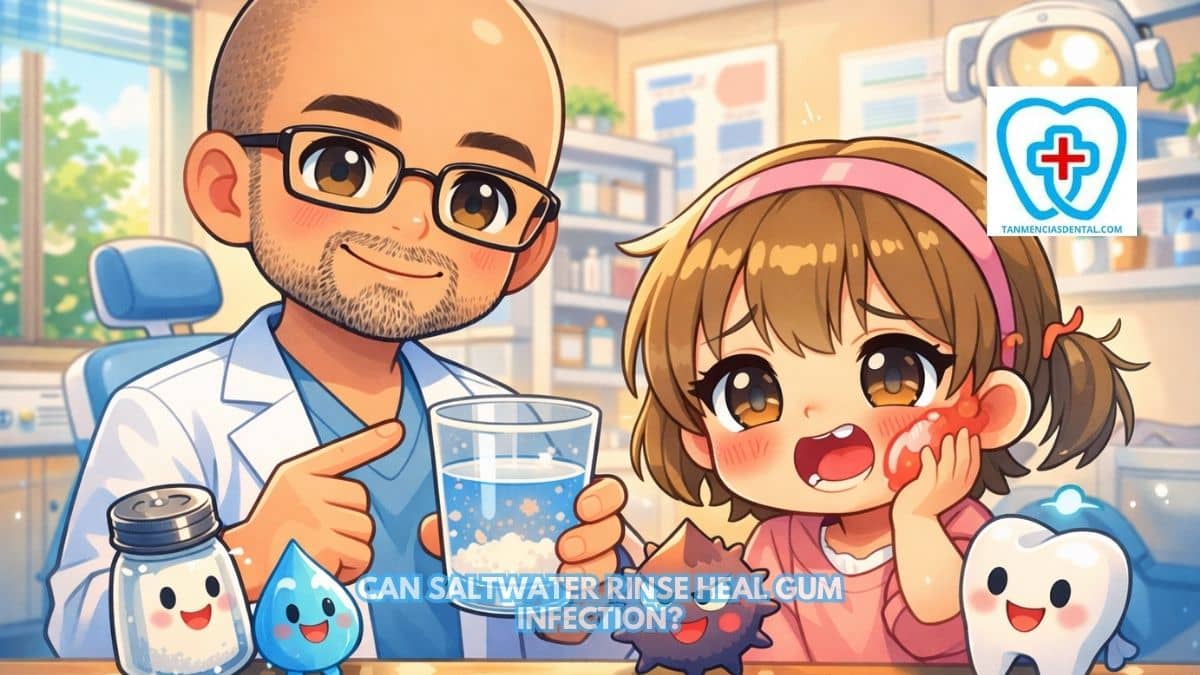Gum infections can cause pain, swelling, and bleeding that make it hard to eat or speak comfortably.
Many people turn to home remedies and ask, can saltwater rinse heal gum infection, or is it only a short-term fix?
Saltwater rinses are simple to prepare and may help soothe irritated gums, but they do not treat every type of infection.
Understanding what saltwater can and cannot do is important before relying on it.
We’ll explain how saltwater works, when it may help, and when professional dental care is necessary.
By the end, you’ll have a clear idea of whether a saltwater rinse fits into your gum care plan.
1. What are Gum Infections? Understanding the Basics
Gum infections begin when bacteria build up along the gum line and cause irritation and swelling.
If plaque is not removed through regular brushing and flossing, it can harden into tartar and trap more bacteria.
Gingivitis is the early stage, and it often leads to red, swollen gums that bleed easily.
When left untreated, gingivitis can progress to periodontitis, which is a more serious form of periodontal disease that damages the tissue and bone supporting the teeth.
As periodontal disease advances, gums may pull away from the teeth and create deep pockets where bacteria continue to grow.
Recognizing these early signs can help you seek treatment before lasting damage occurs.
🦷 How Poor Oral Hygiene Leads to Serious Diseases Caused By Not Brushing Your Teeth
2. Which Gum Problems Can a Saltwater Rinse Actually Help?
Not all gum infections are the same, and saltwater does not work for every type.
It may help with mild gum irritation or early gingivitis, where the gums are slightly swollen, red, or bleed during brushing.
In these early stages, a saltwater rinse can soothe the tissue and help reduce minor swelling.
However, it cannot treat deeper infections such as a gum abscess or an infected tooth.
These conditions involve bacteria trapped below the gum line or inside the tooth, and they require professional care.
Saltwater also cannot clean deep periodontal pockets caused by advanced gum disease.
Understanding this difference helps prevent people from mistaking a serious dental infection for simple gum inflammation.
🦷 Can Bad Teeth Kill You? The Surprising Link Between Oral Health and Life-Threatening Diseases
3. The Science Behind Saltwater: How It Helps Your Gums
Saltwater works by creating a saline solution that cleanses the mouth and helps reduce bacteria levels.
The salt in the solution creates an osmotic effect, drawing out excess fluid from swollen gums, which can reduce inflammation and discomfort.
It also makes it harder for harmful bacteria to survive in the mouth by balancing the pH level.
This antibacterial effect can prevent the spread of infection in minor cases.
While these benefits are helpful, saltwater rinses should not replace professional dental treatments for serious infections.
🦷 Is It Normal To Experience Temporary Tooth Sensitivity After A Cleaning?
4. Key Benefits of Using Saltwater Rinses for Oral Health
Saltwater rinses are simple to make and can help relieve mild gum irritation or infection.
They can soothe inflamed gums, reduce pain, and aid in cleaning areas where brushing might not reach.
By flushing out food debris and bacteria from gum pockets, a saltwater rinse helps keep the mouth cleaner between brushings.
This can prevent minor infections from worsening and support healing after dental procedures.
However, while helpful, they should be viewed as part of a broader oral care routine rather than a standalone treatment.
🦷 Can You Drink Tea After Brushing Your Teeth?

5. How to Prepare and Use a Saltwater Rinse Effectively
To make a saltwater rinse, dissolve 1/2 teaspoon of salt in one cup of warm water and stir until the salt fully dissolves.
Use warm water because very hot or very cold water can irritate sensitive gums and increase discomfort.
Once the mixture is ready, take a small sip and gently rinse your mouth for about 30 seconds.
Move the liquid around slowly so it reaches the front, back, and sides of your gums, especially the sore area.
Avoid swishing too hard, since strong pressure can irritate already inflamed tissue.
Spit the solution out after rinsing and do not swallow it, as the salt content is not meant to be ingested.
You can use a salt water rinse up to three times a day, but using it too often may dry out your mouth and slow healing.
🦷 Will Undergoing Oral Prophylaxis Finally Help Eliminate My Bad Breath?
6. Recognizing the Limitations of Saltwater Rinses
While saltwater rinses can help ease discomfort and reduce mild inflammation, they are not a cure for serious gum infections.
They can’t eliminate bacteria that are deeply embedded in the gums or treat the root cause of an infection, like plaque buildup or tartar.
Relying solely on saltwater without seeking professional care for severe symptoms can lead to a worsening condition.
Saltwater is a temporary aid and works best as part of a broader treatment plan.
For serious cases, deeper cleaning, medications, or even surgery may be required to fully resolve the issue.
🦷 Are Bananas Good For Your Teeth? Understanding Their Impact on Oral Hygiene
7. Potential Risks of Using Saltwater Rinses: What to Watch For
Though generally safe, saltwater rinses can pose risks if used improperly.
Overuse can lead to a dry mouth, which may worsen gum sensitivity or create an environment where bacteria flourish.
Additionally, people with high blood pressure or sodium restrictions should be cautious, as the salt can be absorbed through the mouth.
Another concern is relying on saltwater to mask symptoms, delaying the diagnosis and treatment of more serious gum conditions.
It’s important to monitor any unusual reactions and adjust use accordingly.
🦷 Can Oral Prophylaxis Provide Natural Teeth Whitening Effects?
8. Enhancing Your Oral Care Routine: Complementary Practices
Incorporating saltwater rinses into your oral care routine can be beneficial, but they should complement, not replace, daily brushing and flossing.
Use fluoride toothpaste and a soft-bristle toothbrush to clean your teeth twice a day, and floss to remove food particles and plaque between teeth.
Antimicrobial mouthwashes can also be helpful in reducing bacteria that cause gum infections.
Eating a diet rich in vitamins C and D supports gum health and strengthens the immune system.
Regular dental checkups are essential to catch and treat issues early before they become more serious.
🦷 How Often Should I Get A Cleaning To Maintain Optimal Gum Health?
9. When Is It Time to See a Dentist? Signs to Look Out For
If symptoms of a gum infection last more than a week, even after using a saltwater rinse, you should schedule a dental visit.
Ongoing bleeding gums, especially when brushing or eating, can be an early sign that the problem is not improving.
More serious warning signs include pus, severe pain, or gums that pull away from the teeth.
Loose teeth or constant bad breath may also point to advanced gum disease.
Although a saltwater rinse may ease discomfort for a short time, it does not treat the root cause of the infection.
Getting prompt dental care can stop the condition from worsening and help protect your teeth and gums from long-term damage.
🦷 Why Oral Prophylaxis Matters for Your Oral Health
10. What Does the Research Say? Evidence on Saltwater Rinses
Research shows that saltwater rinses are effective at reducing inflammation and managing symptoms of mild gum infections temporarily.
Studies support the claim that saltwater helps balance pH levels in the mouth and minimizes bacteria, aiding in short-term relief.
However, scientific evidence also highlights that saltwater rinses are not a comprehensive treatment for more severe infections.
They work best in combination with professional dental care and regular oral hygiene.
While helpful for soothing gums, saltwater should not be viewed as a substitute for antibiotics or deep cleaning procedures needed for advanced infections.
🦷 Dental Diagnostics In Marikina
11. Real Experiences: Testimonials from Saltwater Rinse Users
Many people share positive experiences with using saltwater rinses for minor gum irritation and after dental treatments.
Users often report reduced swelling and discomfort after just a few uses, particularly for mild cases of gingivitis or post-surgery care.
However, several people emphasize that while it’s effective in soothing symptoms, it doesn’t fully eliminate deeper infections.
Testimonials often mention that saltwater rinses are a helpful first step, but long-term gum health requires consistent oral hygiene and professional dental visits.
Overall, users find it valuable for temporary relief but recognize its limitations.
🦷 Comprehensive Dental Solutions in Marikina
👨⚕️ Conclusion
A saltwater rinse can help manage mild symptoms of a gum infection by reducing inflammation and flushing out bacteria.
However, it’s not a complete solution and should be used alongside other oral hygiene practices and professional dental care.
For more serious infections, relying on saltwater alone can delay necessary treatment and lead to complications.
The rinse provides temporary relief but doesn’t address the underlying causes of infection, such as plaque buildup or tartar.
It’s essential to consult a dentist for persistent or severe symptoms to prevent long-term damage.
❔ FAQs
1. How often should I use a saltwater rinse for a gum infection?
You can use a saltwater rinse up to three times a day for mild gum irritation.
Using it more often may dry out your mouth and irritate your gums.
It should only be a short-term support, not a long-term treatment.
If symptoms last more than a week, you should see a dentist.
2. Can a saltwater rinse cure a gum abscess?
No, a saltwater rinse cannot cure a gum abscess.
An abscess is a deeper infection that usually contains pus and needs professional treatment.
Saltwater may help ease discomfort for a short time, but it does not remove the source of the infection.
A dentist may need to drain the abscess or treat the infected tooth.
3. Is saltwater better than mouthwash for gum infections?
Saltwater can help soothe mild gum irritation and reduce swelling.
However, it does not replace medicated or antimicrobial mouthwashes recommended by a dentist.
Some mouthwashes are designed to reduce bacteria more effectively.
The best choice depends on the type and severity of your gum problem.
4. Can I swallow saltwater after rinsing?
No, you should spit out the saltwater after rinsing.
The solution contains a high amount of salt and is not meant to be swallowed.
Swallowing it may upset your stomach or increase your sodium intake.
Always rinse gently and spit it out when finished.
5. How do I know if my gum infection is serious?
A serious gum infection may cause severe pain, pus, loose teeth, or swelling that does not improve.
Fever or swelling that spreads to the face or jaw is also a warning sign.
If your symptoms get worse or do not improve after a few days, seek dental care.
Early treatment can prevent more serious problems.
😁 Self-Promotion
Visit Tan-Mencias Dental Clinic in Parang, Marikina City, for exceptional dental care in a welcoming environment.
Our skilled team is ready to help you with all your dental needs, from routine checkups to specialized treatments.
Have any questions or concerns?
Feel free to call us at 0917-145-1074, send a message through our Facebook page, or use our website’s contact form.
We’re here to ensure your smile stays healthy and bright!

